To establish and manage a robust online presence, choosing the best CMS for website development becomes prominent for businesses.
Updated 3 September 2024

Director at Appventurez
To establish and manage a robust online presence, choosing the best CMS for website development becomes prominent for businesses.
A content management system (CMS) is imperative in building and managing your website. It helps business owners create and manage content, especially with little programming knowledge.
More than 76 million websites have already availed benefits from a CMS solution. By collaborating with a reliable website development company and choosing a suitable CMS solution, you can build a robust website and generate traffic.
However, with thousands of content management systems in the market, picking the best CMS for website development takes work. Since different CMSs have different pros and cons, it is crucial to choose one that aligns with your business goals and budget.
We have compiled a list of the most popular CMSs to simplify this task. In addition to encompassing the top CMS platforms, we will discuss the notable features to remember while choosing.
A content management system (CMS) is software that helps users create, manage, and modify content on a website without technical knowledge. Put differently, a content management system (CMS) enables you to create a website without the need to start from scratch or even have any coding experience.
Nowadays, most content management systems are pretty adaptable. While some, like Magento and eCommerce, are specifically designed for a particular purpose, the most widely used content management systems can be used to develop almost any website.
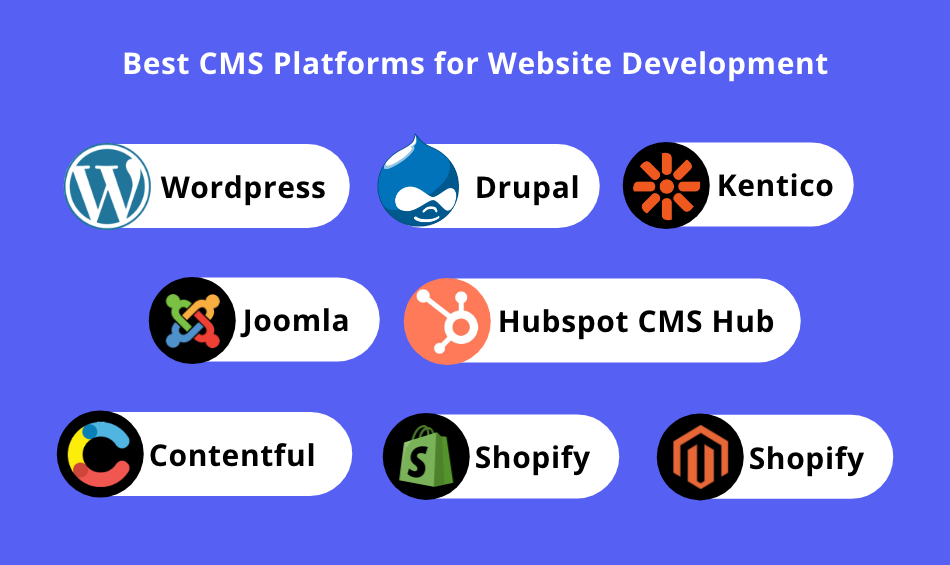
A content management system helps easily manage, modify, and publish content on your website. Below is the list of the best CMSs for website development that you can consider for handling your site’s content efficiently.
WordPress is the most widely used content management system, used by almost 43.2% of all websites. Open-source WordPress software is renowned for its adaptability and scalability. Its library of more than 58,000 WordPress plugins also assists users in building any kind of website.
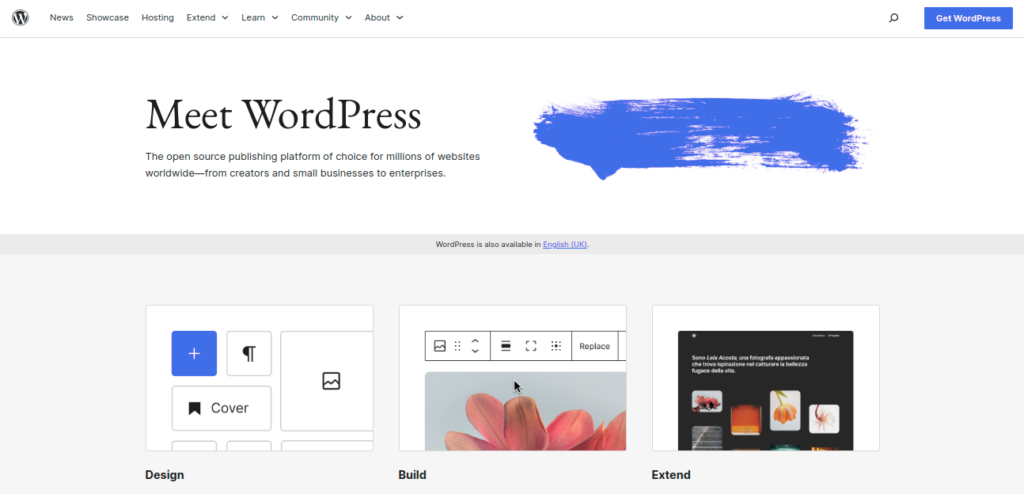
WordPress can be utilized by users of all skill levels, from those starting a basic blog to those building a big website. Sony Music is a prominent example of a WordPress website that showcases photographs and videos of its featured performers.
Users must get web hosting and a domain name to use the free WordPress software. Some hosting companies provide both in a single plan:
User management ‒ assigns roles and access to different user types: administrators, editors, authors, contributors, and subscribers.
The open-source CMS Joomla powers more than 2 percent of websites. Its core software provides additional capabilities, such as multilingual features, compared to competing CMS platforms. However, non-technical users may need help finding the first Joomla configuration.
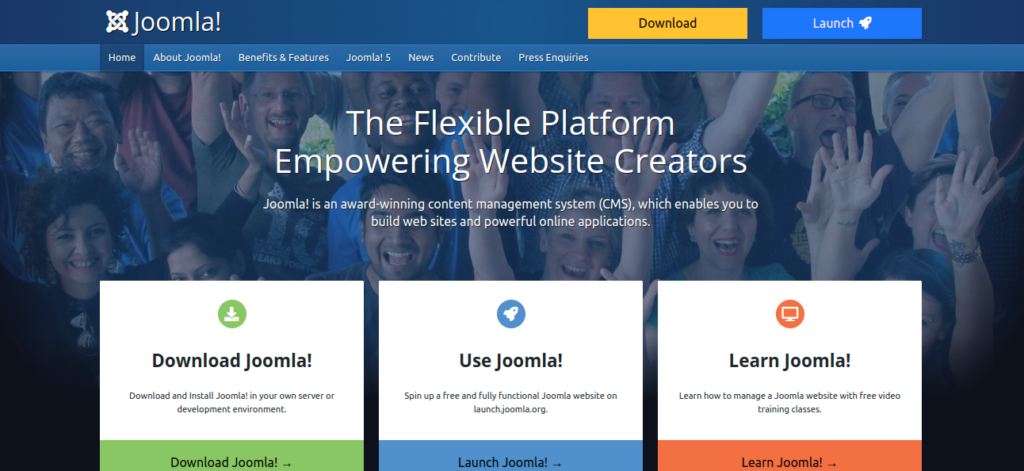
Manage a site with hundreds of sub-pages efficiently.
Lack of compatibility between different modules, extensions, and plugins.
Joomla works well for professional websites that several persons oversee. Consider the official website of Roger Federer, the world-renowned tennis player. This website features a shop, a news platform, and his portfolio.
Just like WordPress, Joomla has optimized plans for your business:
Multilingual setting. More than 70 languages are available for the websites using the platform’s core software.
Its adaptable API architecture supports various digital platforms and is intended for professional web development. Unlike WordPress and Joomla, Drupal optimizes its built-in features for improved security and performance. Websites running on Drupal receive more visits than those running on competing CMS programs.
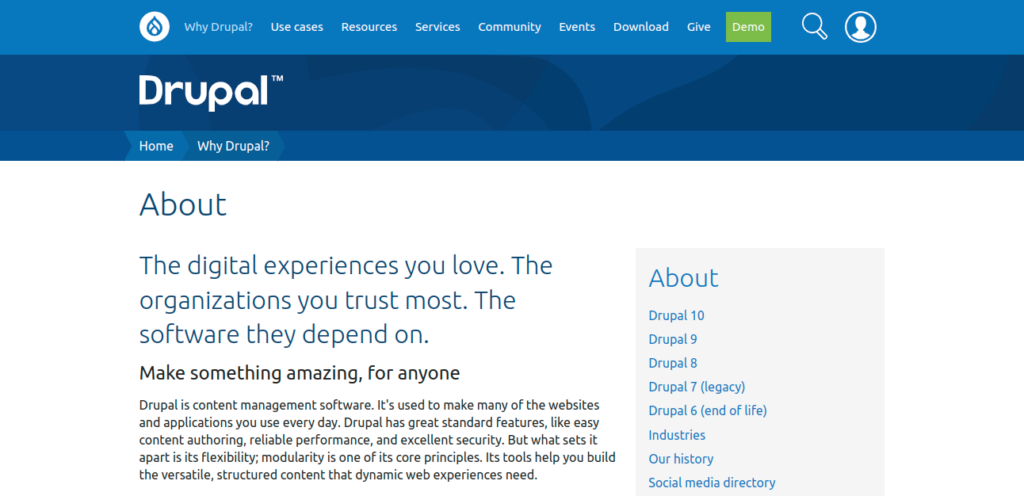
Less vulnerable to security threats as the CMS software conducts security tests regularly.
Requires coding knowledge of PHP, CSS, and HTML.
Drupal is a good CMS platform for advanced users with great technical knowledge who want to create large-scale and complex sites. For example, the official website of the City of Los Angeles uses Drupal to provide updates and information about the city.
The pricing for Drupal depends on the web hosting and the domain name. Here are Drupal hosting plans that come with a free domain:
Personalization: Use data from geolocation, browser history, device type, and behavior taxonomies to create a personalized customer experience.
Magento is one of the best eCommerce platforms. The CMS software focuses on security, SEO, and customization to optimize all types of eCommerce sites. As it caters to bigger online stores, the platform is powerful enough to feature many products and orders.
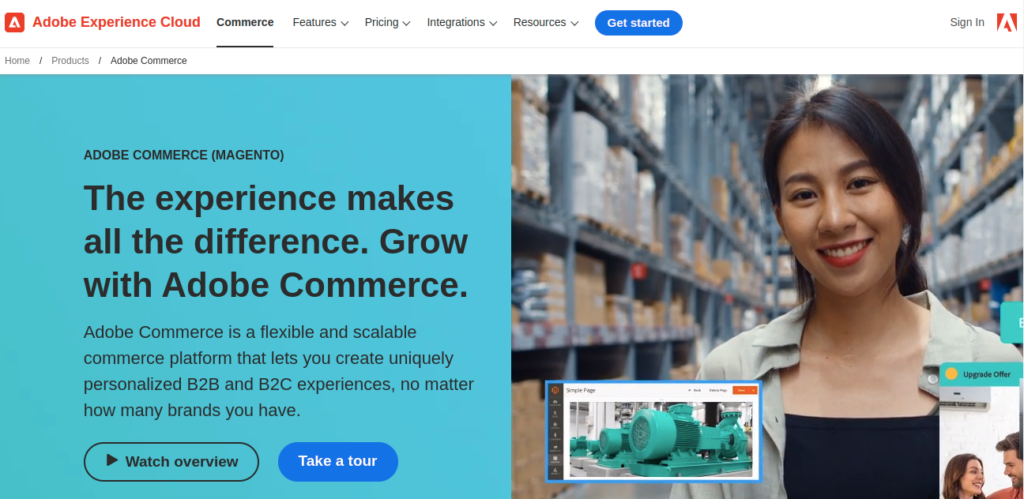
Manage multiple stores in various locations, using different languages and currencies.
Customizing design and listing products is time-consuming.
Magento is great for medium—to large-scale eCommerce stores. One large eCommerce store using Magento is Olympus, which sells cameras, audio equipment, and binoculars.
Magento’s three different versions influence the cost of using the platform. The Magento Open Source platform is free but requires a web hosting provider and a custom domain. Hostinger’s VPS hosting plans are recommended for Magento:
Catalog management: Showcase products virtually using inventory management, including immediate product creation and dynamic pricing.
Another well-liked CMS for small-to-medium-sized eCommerce companies is PrestaShop. It is a highly versatile online store management platform because of its large feature set and vibrant community. Thanks to its extensive interface, entering and monitoring products is also simple.
Access to user-friendly eCommerce features for users of all skill levels to create a professional online store.
Lack of scalability to grow into a bigger eCommerce store.
PrestaShop is a great platform for small—to medium-sized eCommerce companies. For instance, Harry Fay, a specialized jewelry retailer in the United Kingdom, offers several rings and wedding bands for sale online.
The PrestaShop software is free but still needs hosting and a domain name. Here is the PrestaShop hosting plan that offers both:
Multiple store management: Manage various stores that share standard components and features.
Open-source Concrete5 software is intended for people with no technical experience. Drag-and-drop content blocks are one of its features that makes content administration and customization easier. Because of its safe user management, it’s also a fantastic CMS for websites with several developers.
Built-in SEO tools, such as adding meta descriptions and creating sitemaps.
No autosave when making changes.
This content management system is ideal for building intricate websites for medium- to large-sized organizations. One example is ITV, a television corporation that streams films and broadcasts online.
Concrete5 itself is free, but the company allows a choice between two types of hosting plans:
However, they do not come with a domain name, so purchasing it elsewhere is necessary.
Marketing tools: To expand a brand, add social media profiles, such as Facebook, Twitter, Instagram, or LinkedIn.
Contentful is a headless CMS, meaning the content is not attached to a web page. Instead, it uses an Application Programming Interface (API) to present content as data. Because of that, the platform has a steep learning curve for non-technical users.
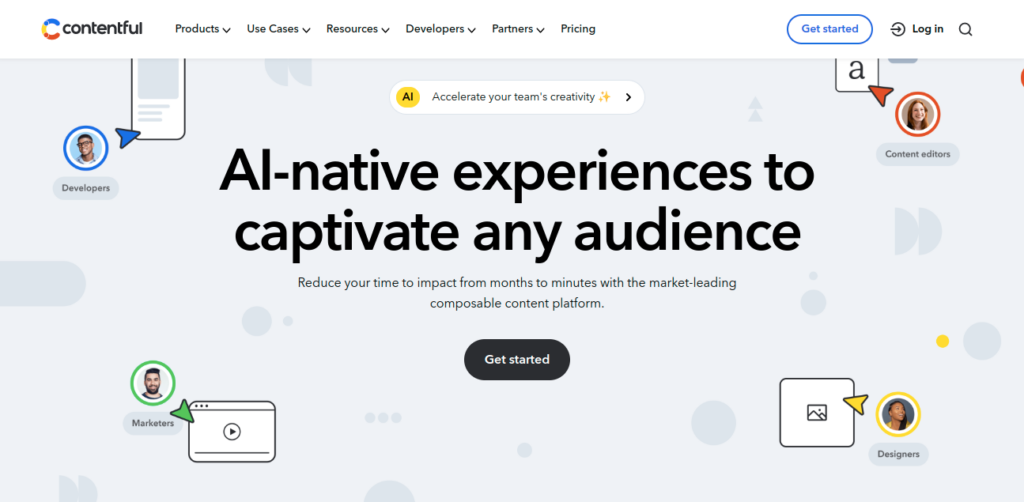
Adaptable to all digital platforms, from web browsers to mobile apps.
Creating content on different platforms requires technical knowledge.
Contentful is excellent for companies or individuals creating custom websites that incorporate other digital platforms. A great example is the Scandinavian Airlines System’s website. There, visitors cannot only book a flight and check in but also download the SAS app.
Contentful offers freemium pricing. There is a free option for those with a domain name and hosting provider. However, a pricing plan for additional tools and support starts at $489/month.
User management: Add other users and assign roles to create content using one account.
This platform provides a simple drag-and-drop interface, allowing you to easily customize the design, add content, and integrate features like contact, social network, photos, videos, etc. With Appy Pie, anyone can build a professional-looking website quickly, making their online presence a breeze.
Harness the power of AI and transform your text into a fully functional website effortlessly
Limited templates sometimes make it hard for users to find relevant or desired website designs for their business
Appy Pie Website Builder is best for beginners and small businesses looking for a simple, user-friendly website development platform.
Unlike other competitors, Appy Pie Website Builder offers a very budget-friendly website buying service:
Multiple payment systems. Accept payments in different currencies with multiple payment gateways, such as Stripe, PayPal, credit cards, etc.
Sitecore is one of the leading enterprise CMSs in the market and is built on ASP.NET. Similar to Contentful, this platform features content creation for multiple digital platforms. This flexible CMS integrates more marketing tools than other popular CMS platforms.
Features that support data privacy more, in compliance with the latest General Data Protection Regulation (GDPR).
High cost in comparison to other CMS options.
This CMS platform is a good option for large-scale organizations that aren’t tight on a budget. An example is the telecommunications equipment company Huawei. The website provides detailed information and updates with high-res images for each product they sell.
The pricing depends on the license based on monthly visits, non-production installations, concurrent users, and add-ons.
Marketing automation. Set up marketing campaigns to automatically respond to visitors’ actions on a site.
Umbraco is one of the best WordPress alternatives. It is an open-source, user-friendly CMS based on Microsoft’s .NET framework. Unlike other open-source platforms, Umbraco is backed by a team of experts that provides enterprise-level support.
Security patches to secure the system directly after identifying a threat.
Many plugins aren’t available for extended functionality.
The Umbraco CMS is suitable for companies that use different types of content like products, recipes, and marketing videos.
The open-source CMS’s pricing is free. However, you will need to get web hosting and a domain name. The Umbraco Professional plan, however, costs $7,500/year and provides licenses, support, and discounts on training.
Grid layout. Freely add content or custom components in any configuration.
Sitefinity is a great CMS platform for digital marketing. What makes this platform unique is that businesses can easily engage and retain visitors. In addition, the platform helps create a personalized visitor journey.
Use a drag-and-drop interface to create and manage design and content efficiently.
Limited third-party integrations.
Sitefinity’s multi-channel experience is great for large websites with high traffic that operate in a fast-paced environment. For example, the World Health Organization migrated to Sitefinity in 2020 to deliver access to critical health information.
Sitefinity offers licensing and subscription, which are its main costs but are customizable depending on individual needs. Furthermore, there is a 30-day trial to test the platform.
Social media manager, Manage Facebook, Google, Microsoft, Twitter, LinkedIn, and GitHub accounts directly from Sitefinity.
Kentico is another headless CMS—cloud-based content management software that uses an API. The platform can efficiently deliver content on different digital platforms. In addition, its great marketing tools help reach more audiences and engage with visitors.
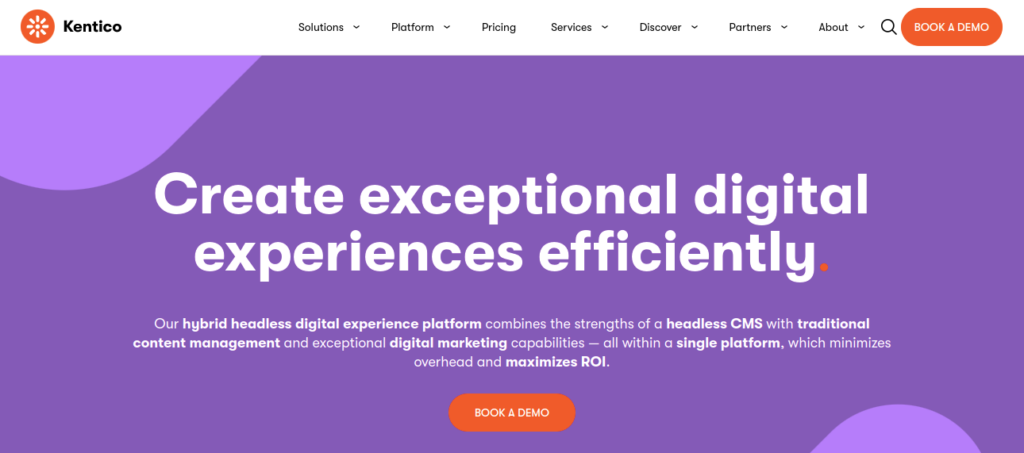
Easy to enhance digital strategy, including content management, eCommerce, and online marketing tools.
The cost is higher than other CMS platforms.
Kentico is great for businesses building large sites that need multi-functionality. An example of a large business site using Kentico is Skype. The website lists its products and has regular blog updates.
Kentico’s headless CMS pricing plans come with several support and tools:
Scheduling. Regularly schedule tasks, including running nightly summary reports and data syncing.
Magnolia is an open-source CMS designed to provide users with tools that support demanding digital experiences. The platform uses the Java language, making it enterprise-grade software with excellent reliability and stability.
It is easy to edit pages and personalize content.
It requires experience in Java to make use of certain features.
This CMS is great for tech products and large-scale businesses that can invest more time in creating various platforms. An example of a website using Magnolia is Procore, a project management software company. The website provides an online product and a demo.
Magnolia does not offer a pricing plan, so users must contact their sales representatives for a quote. However, a free 30-day developer trial and a demo request are available.
Single-page app (SPA). Use the same editor for web pages to edit and manage content for single-page applications (SPAs).
HubSpot CMS is one of the top CMS options for creating a website without the need for constant updates and edits. It’s also perfect for beginners since this platform’s user-friendly tools can help publish a website without technical knowledge. Its great integrated sales and marketing tools also help to increase reach and engagement.
Provide a dedicated team to monitor the platform 24/7, check for attacks, and handle regular virus scans.
Limited gallery for plugins and themes.
The HubSpot CMS is a top choice for marketers and basic websites. Stellar Recruitment, for example, constantly posts job vacancies on its website using this CMS software.
The CMS Hub pricing plans start at $23/month and go to $1,200/month.
Smart Content. Personalize content and call-to-actions on the site by using insights and information on the visitors.
Grav is a file-based CMS platform with simple navigation. Its non-traditional database makes the platform lighter and faster than other CMS software. However, its graphical interface requires some technical knowledge to use.
Powerful taxonomy functionality to create relationships between pages.
Lack of inventory management for eCommerce sites.
Grav is suitable for blogs and portfolios. One example is TeamSpeak, an audio communication software website. One can find offers for multiple products to download and a login and registration section to join the community.
The Grav software is free. However, there are some premium products available to help optimize a site.
SEO tools. Optimize URLs and add metadata to web pages.
As technology develops, more CMS appears in the market. These content management systems vary in functionality, capacity, operation, and even the kinds of users they support, yet occasionally share similarities. However, they are the typical ones.
These turnkey systems include everything you need to administer your website and content and get started. The top website builders are easily navigable content management systems (CMS) that anybody can use to manage files, a blog, SEO, your site’s appearance and feel, and backend functions. These are perfect for new and small business owners who only need a little customization.
When choosing an open-source CMS system, you have significantly more flexibility and control over your website’s appearance, feel, and operation. The cost is that learning and using it is substantially more difficult. These are more appropriate for web development or big companies that can afford the higher development costs and require or desire a customized solution.
A third-party provider hosts a cloud-based CMS with two types: full cloud and partial cloud. Cloud-based CMS types are for businesses that want another to manage their CMS infrastructure either fully or partially. Users cannot customize the full cloud CMS to their needs, but the partial cloud CMS located at each user’s cloud-based server allows alterations through source codes or specific modules. Cloud-based CMS generally requires ongoing support.
Larger institutions often use an enterprise CMS, as it has advanced features and capabilities and supports volumes of content and users. It collects and manages an organization’s big data, including emails and reports, and helps it deliver relevant content to target audiences.
This type allows you to create and publish content without a front-end user interface. It also allows you to manage your content seamlessly, delivering various categories and types of content to web platforms, mobile devices, and Internet of Things (IoT) products.
Different content management systems exist — some are open-source and free to access. Others are paid and charged a specific fee to use them. To use the best open-source CMS, you need to pay for hosting. The pricing model of these CMS can significantly impact your overall cost of website development.
Another factor to consider when determining whether the chosen platform is the best CMS for website development is its SEO friendliness. Ensure that the CMS platform you pick offers relevant tools that help your site rank on search engines.
Not all CMS website development tools offer this, but personalization is a great addition when choosing the right platform. The right plugins and themes should be included in the content management system, helping to boost website functionalities, improve performance, and increase conversions.
This is one of the most crucial aspects to consider while choosing the best CMS for website development, especially when it will hold ample user data. Some of the top CMS platforms manage security for you, while with others, you need to take responsibility for the same.
No matter how advanced your website’s CMS is, it can’t be the best CMS for website development if it’s challenging or needs high-scale development knowledge. Ensure the CMS platform syncs with business objectives and pushes your enterprise toward its goals.
Exploring the best CMS for website development and management is a hefty task, especially when so many options are available. However, a reliable website development company can help you select an ideal CMS solution for your business.
With over a decade of professional experience in website development and design, our experts at Appventurez can assist you with choosing the best content management system. We are also well-versed in crafting immersive websites delivered with seamless website design services.
Apart from website creation, our developers can also build robust web apps with impeccable web application development services. So, if you have a great idea or want to enhance your existing website, we have your back. Consult our experts and elevate your digital presence with a perfect web solution.
Q. What are CMS platforms?
A CMS platform helps users maintain their website by easily creating, modifying, and updating the content. Additionally, these platforms enable website developers to build and manage a website without coding.
Q. Which of the following capabilities are offered by web content management tools?
The best web content management systems provide users with opportunities to create, design, and manage personalized content for their websites. Besides, these platforms help in reviewing content before publishing and automating the publishing process.
Q. Which is the most popular CMS?
WordPress is considered the best CMS for website development and management for its ease of use, flexibility, and customization. Other than that, Drupal, Joomla, and Shopify are some other prominent examples of content management systems.


Elevate your journey and empower your choices with our insightful guidance.

Director at Appventurez
Director and one of the Co-founders at Appventurez, Chandrapal Singh has 10+ years of experience in iOS app development. He captains client coordination and product delivery management. He also prepares preemptive requisites and guides the team for any possible issues on a given project.
You’re just one step away from turning your idea into a global product.
Everything begins with a simple conversation.